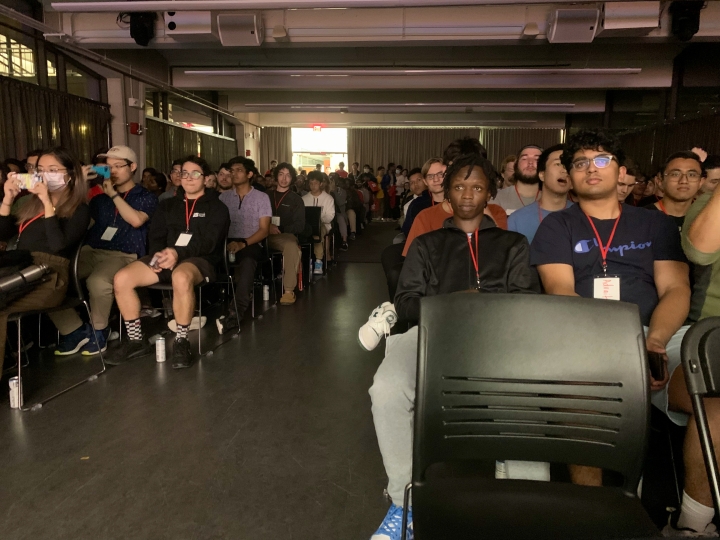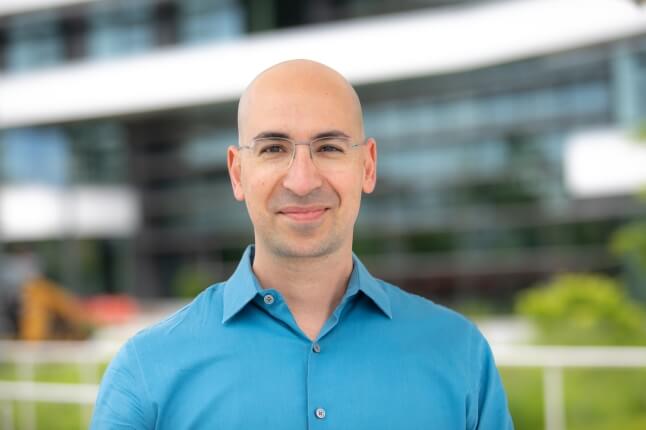News
It’s 11:59 p.m. on a Saturday night, and the Student Organization Center at Hilles is buzzing with activity. The smells of freshly brewed coffee, leftover pizza and sub sandwiches fill the air, and on every floor students hover over laptops or near whiteboards, interspersed with others catching a few hours of sleep on air mattresses. It’s a cacophony of programming terminology, equipment requests, laughter and clanking billiard or ping pong balls.
HackHarvard 2022 co-directors Edward Kang and Nathan Li, left and right, and former director Cameron Akker, middle, after the opening ceremonies. (Sophia Wang)
It’s HackHarvard 2022 – a 36-hour hackathon that pushed programmers to the limit as they tried to finish their projects ahead of a Sunday 8 a.m. deadline.
“It was a truly electric environment that reminded me why people enjoy hackathons so much in the first place,” said Nathan Li, one of HackHarvard’s co-directors and a second-year computer science student at the Harvard John A. Paulson School of Engineering and Applied Sciences (SEAS).
This was the seventh HackHarvard event, but the first since 2019 in which programmers gathered in person. Going remote for a couple years due to the pandemic did nothing to dim enthusiasm for the event, as 500 programmers and volunteers packed all four floors at Hilles, representing colleges and universities from all over the globe.
“Going to hackathons is among the best ways for engineering students to use their time,” said Edward Kang, HackHarvard co-director and a second-year CS student. “Hackathons are a magical venue where hackers get to solely focus on turning ideas into reality: brainstorming with new friends from across the world, learning from mentors and workshops and speakers, and hacking away until their final pitch to judges.”
HackHarvard 2022 tasked programmers with designing a product in one of four categories: entertainment, education, blockchain, and lifehack. While many programmers used the early hours of the event to brainstorm potential projects, one all-Harvard team showed up with an idea already in place: DexteriKey, a pair of gloves that can type on any surface, with or without an actual keyboard, and have corresponding letters appear on a computer terminal.
For the first hours, the DexteriKey team focused on coding a program to light up LEDs on the gloves’ control board. With that framework in place, they spent 15 hours of the second day scaling up to the final product, working until 4 in the morning. They wrapped it all up with two hours of work on their pitch before turning it in.
“We knew that each of us had different strengths and prior experiences, such as previous electrical engineering, competitive programming, product management and augmented reality/virtual reality,” said Justin Ji, a first-year student planning to concentrate in CS at SEAS. “Since we knew that we would be most efficient if we split up and worked to our strengths, we worked on different tasks for the most part. However, since we all are proficient in programming, it was common for one of us to ask another for help if we got stuck.”
DexteriKey members Victor Cai, Andrew Gu, Russell Li and Justin Ji work on their project during the first night of HackHarvard 2022 at the Student Organization Center at Hilles. (Matt Goisman/SEAS)
When you only have 36 hours, balancing time management and personal health needs becomes critical. Not eating or sleeping enough can eventually impair a person’s abilities, but any time spent away from the project can’t be made up later. The DexteriKey team opted to take breaks and sleep at the same time, so that their work would always be synchronized.
“The first day ringed of the bustling collaboration of teammates pitching their ideas and discussing how to implement them,” said Victor Cai, an electrical engineering student. “The second day, our team met in the Science and Engineering Complex (SEC) rather than the Student Organization Center at Hilles, as our group was creating hardware in addition to our software. We were the only HackHarvard group working in the SEC Electrical Engineering Lab, so the atmosphere was quieter but still filled with a steady sense of tempo.”
Andrew Gu, a math and CS student at SEAS, said his team didn’t rely too much on caffeine for extra stimulation while working at the SEC. But back at Hilles, the opposite took place.
“The hackers loved Red Bull and coffee,” Li said. “We went through over 600 cans of Red Bull and 1,000 cups of coffee. The bigger meals we provided, like burritos and pizza, were also big hits at dinner that complemented the bagels and muffins we provided for breakfast. We definitely found that any food which was easy for hackers to consume, while also being filling, were the best options for serving.”
HackHarvard 2022 participants gather for the Opening Ceremony at the Student Organization Center at Hilles. (Matt Goisman/SEAS)
As the project submission deadline neared, the stress increased. The experience isn’t that different from a school project, just compressed and supercharged due to the short turnaround time.
“Having more time available allows students to move through the creative process in an organized fashion,” said Russell Li, a first-year math and economics student and the final member of team DexteriKey. “The 36-hour time limitation flipped the harmonious sequence of brainstorming, outlining, drafting, taking time off to consider viability, then returning to work on its head. It would be analogous to a sprint, compared to the marathon of a school project. From the get-go of the hackathon, we were forced to rapidly scan through idea after idea and implement the first working solution that we thought of. Along the way, if we ran into roadblocks, we were forced to press on instead of carefully considering alternative approaches.”
Hackathons provide an opportunity to test one’s programming skills in a competitive environment. They can also be an opportunity to make contact with valuable government or industry sponsors, which can lead to funding opportunities to continue the work when the competition ends.
“The sense of team bonding throughout the experience was memorable,” Russell Li said. “The overall sentiment that I remember from the experience is a stressful yet camaraderie-filled atmosphere, and I became much closer to my teammates after completing the event.”
Of course, at the end of a 36-hour competition, the last thing some teams want to think about is more work.
“We were exhausted by the end, as it was 5 a.m. on Sunday before we got DexteriKey to work as intended and recorded our project video,” Cai said. “I definitely felt a sense of pride in what we had accomplished in just 36 hours.”
Topics: Computer Science, Student Organizations
Cutting-edge science delivered direct to your inbox.
Join the Harvard SEAS mailing list.
Press Contact
Matt Goisman | mgoisman@g.harvard.edu





